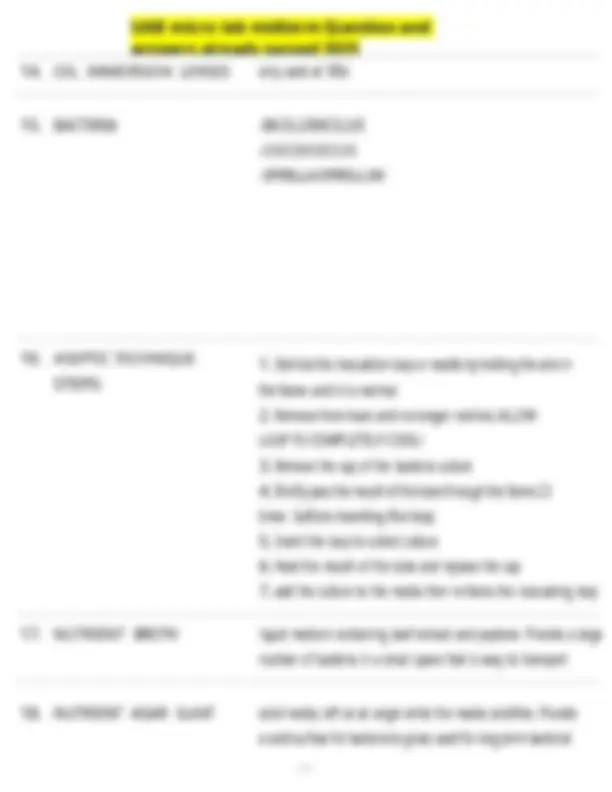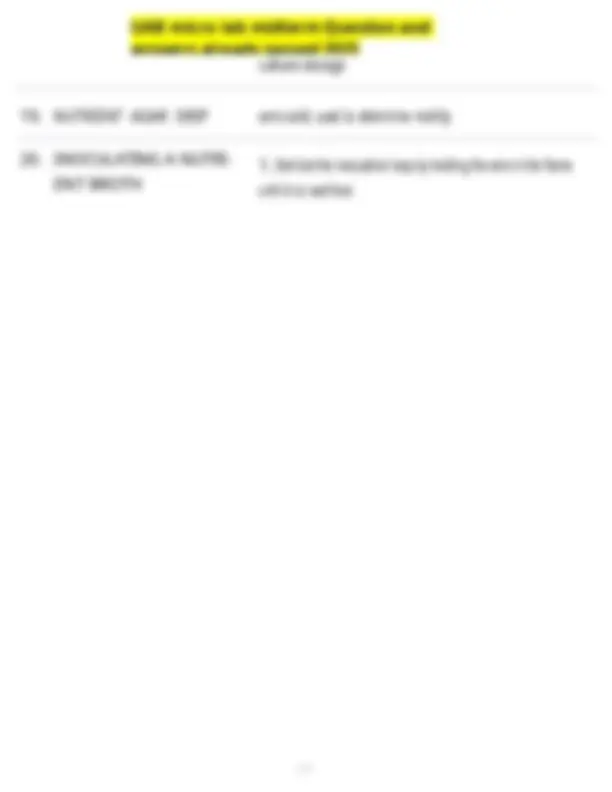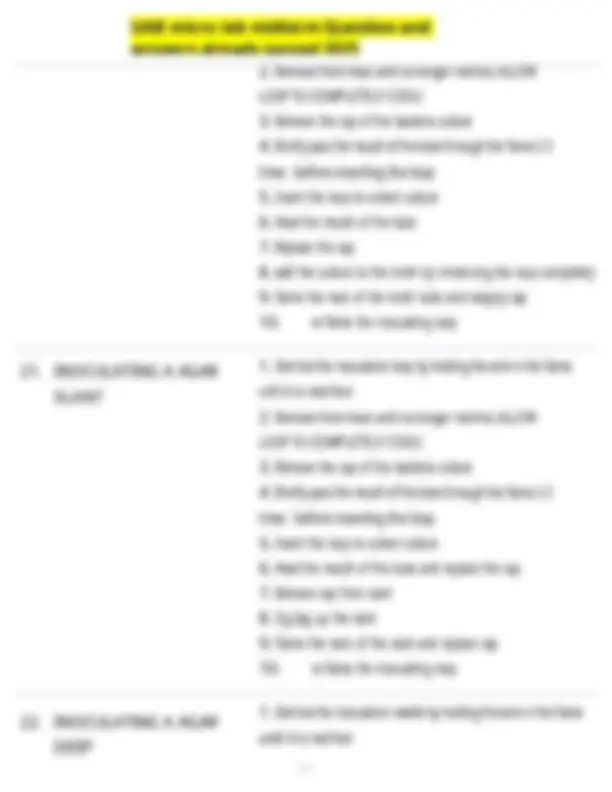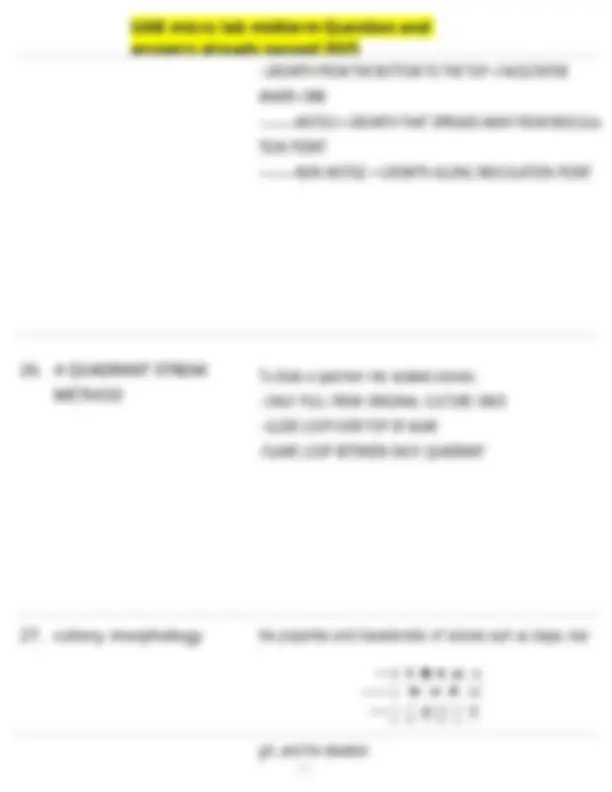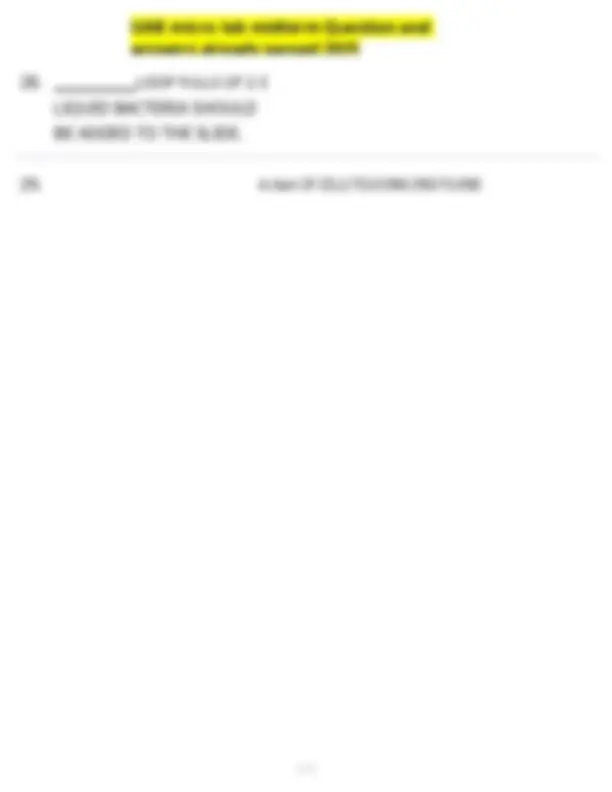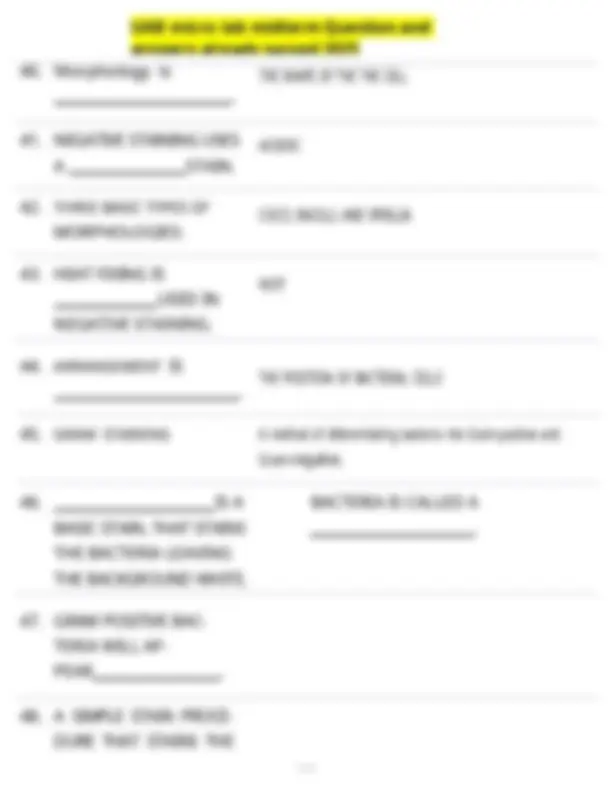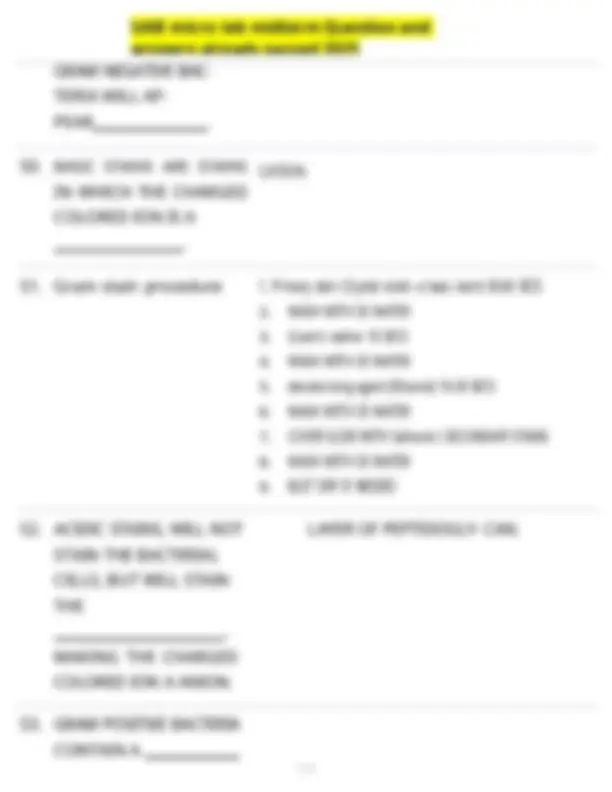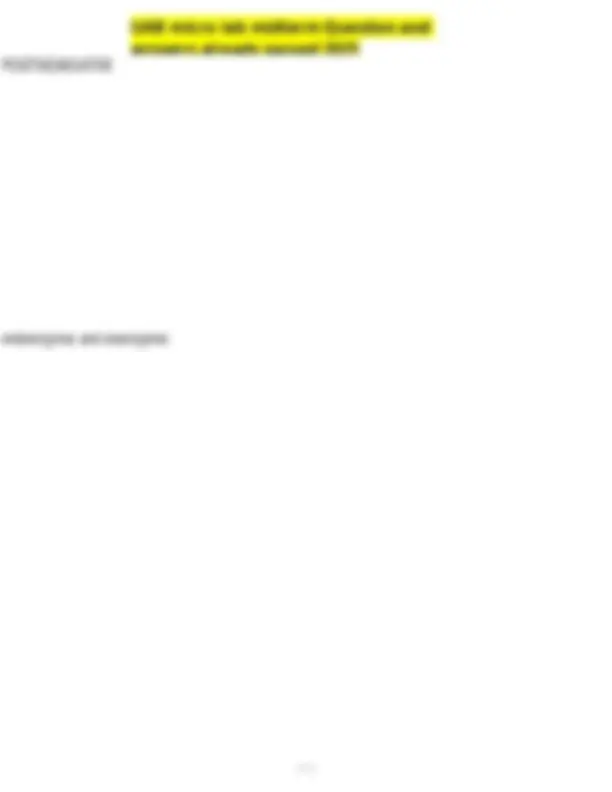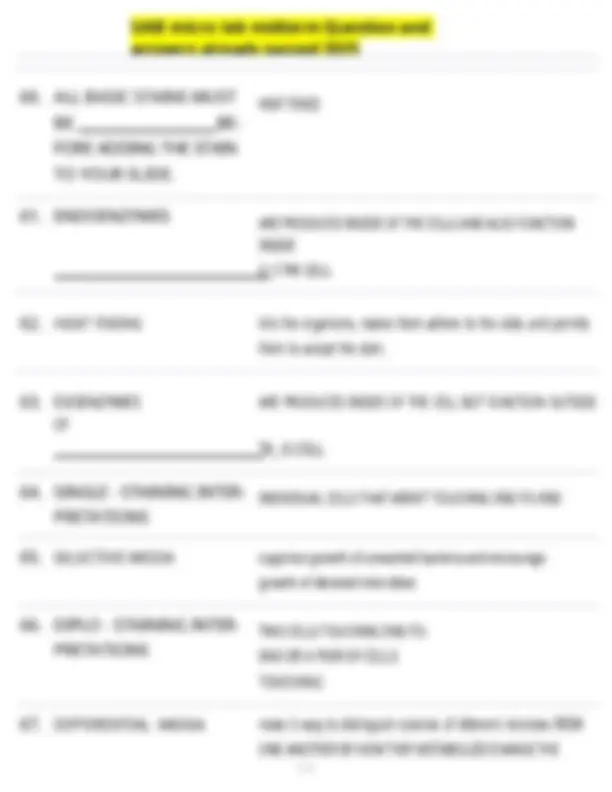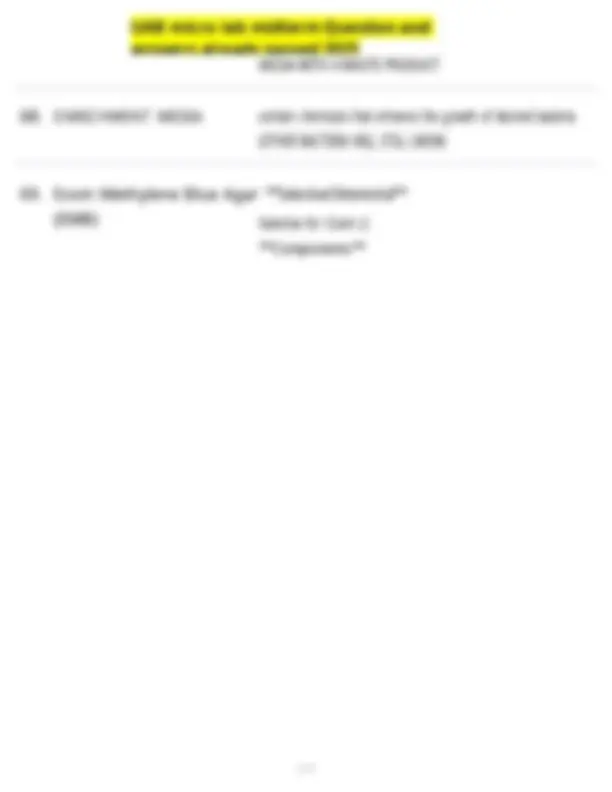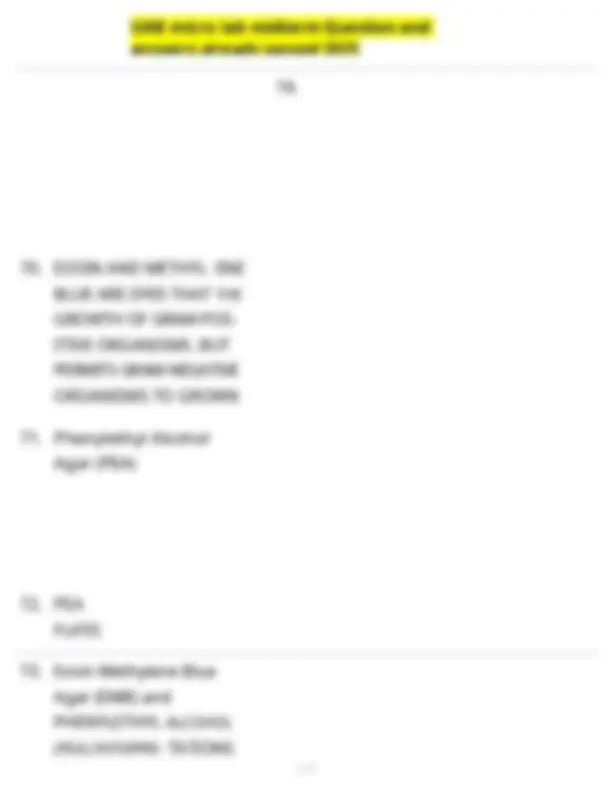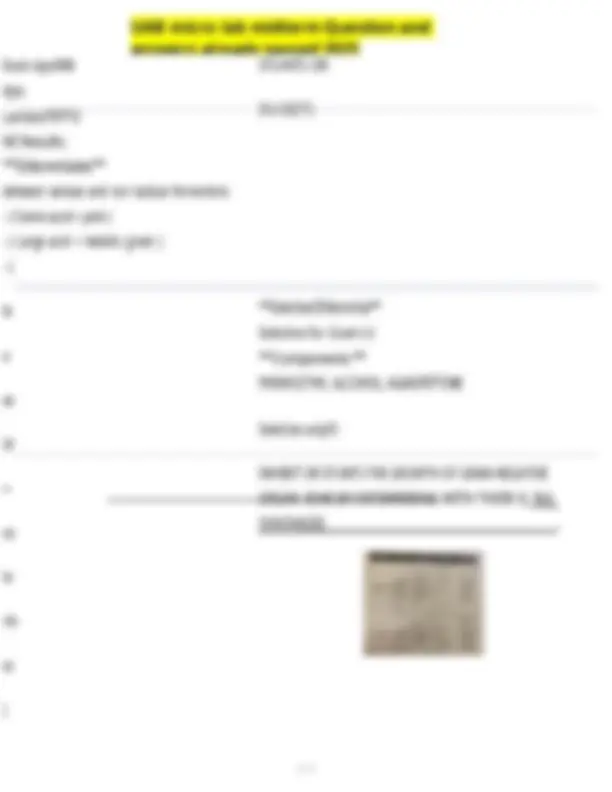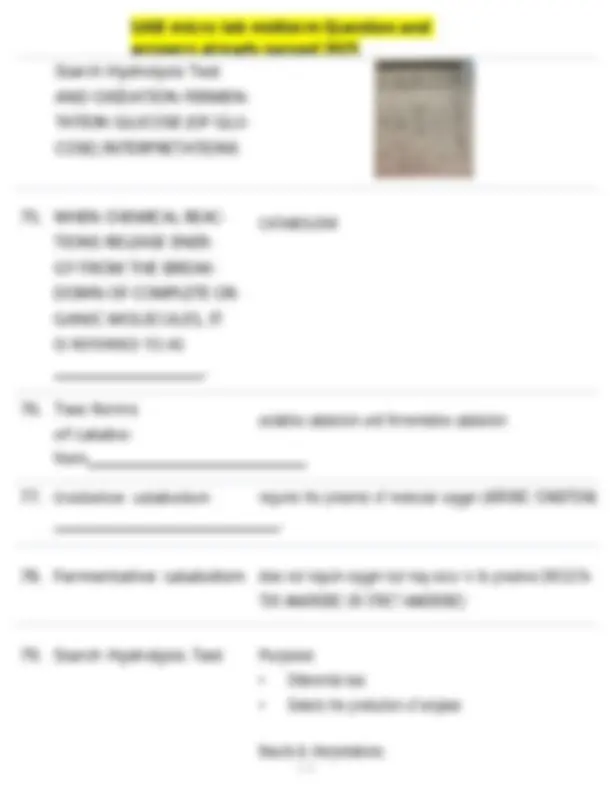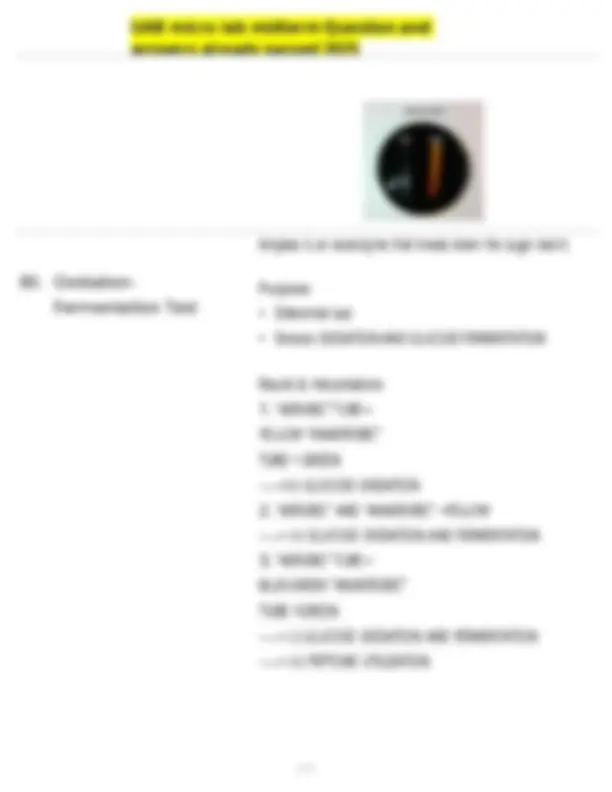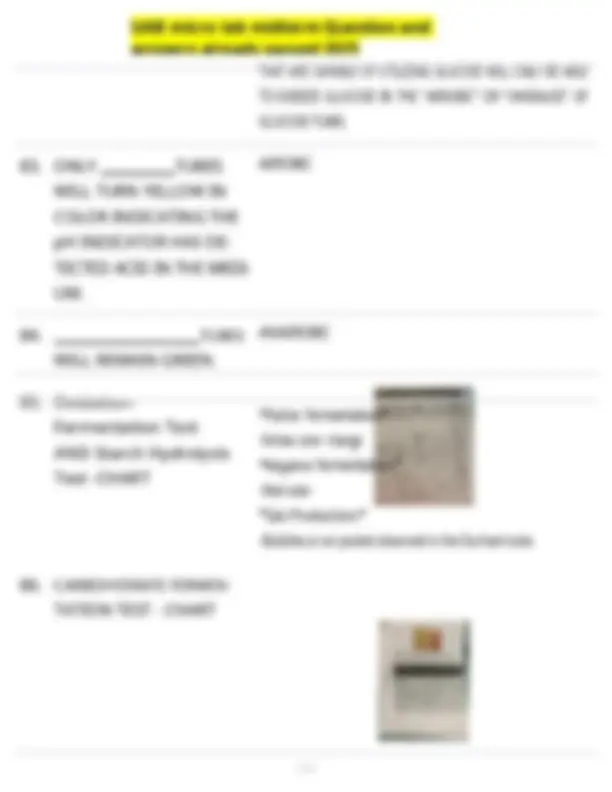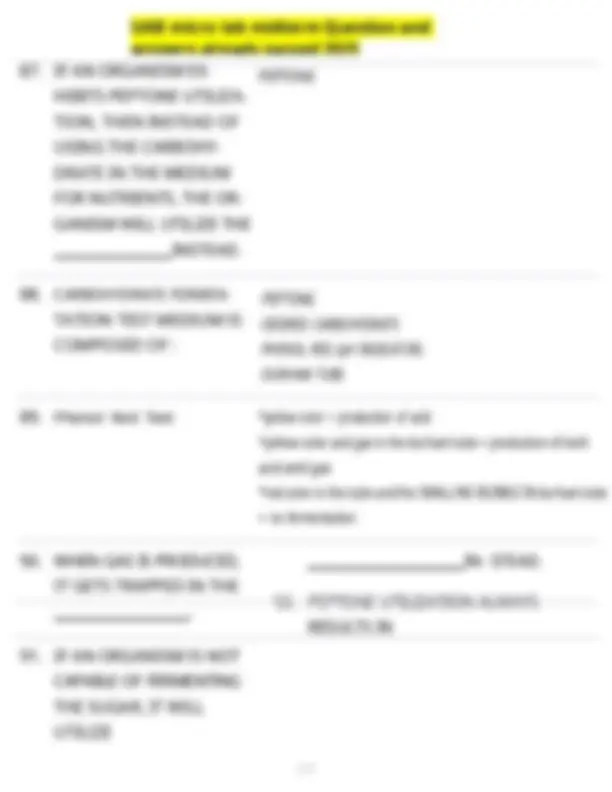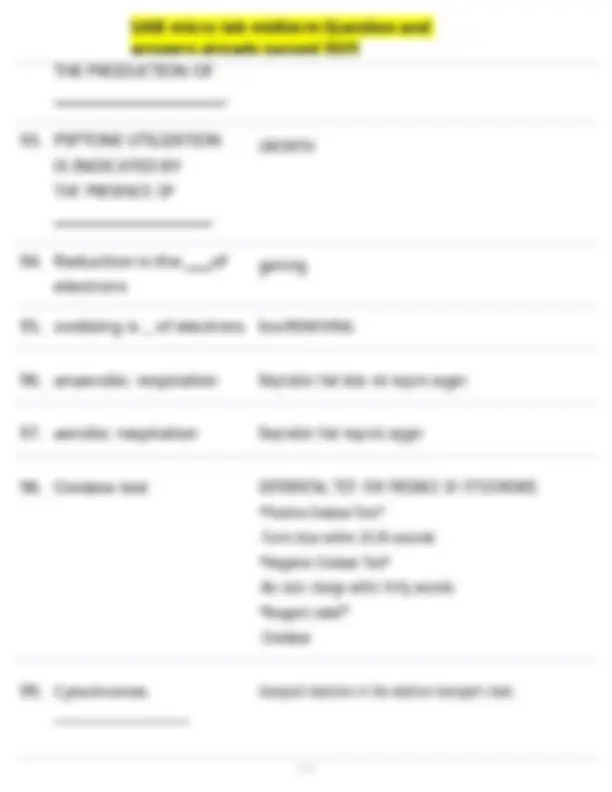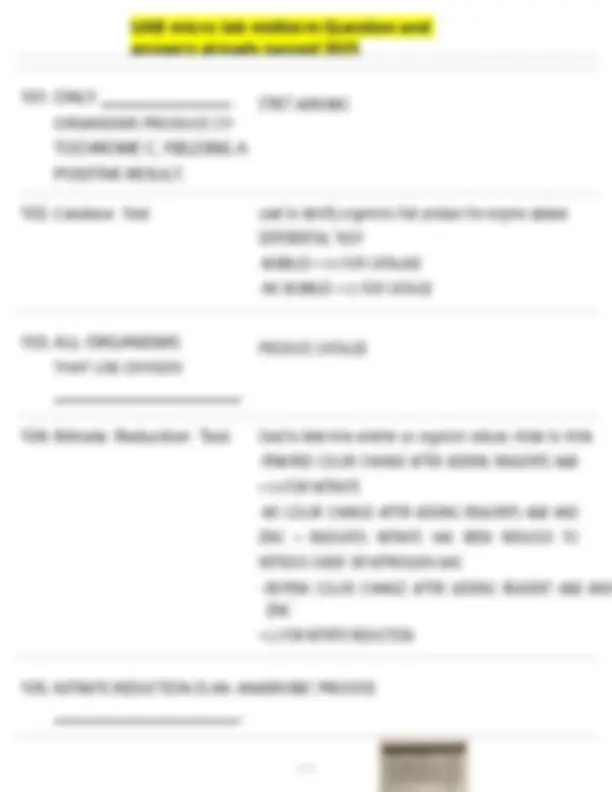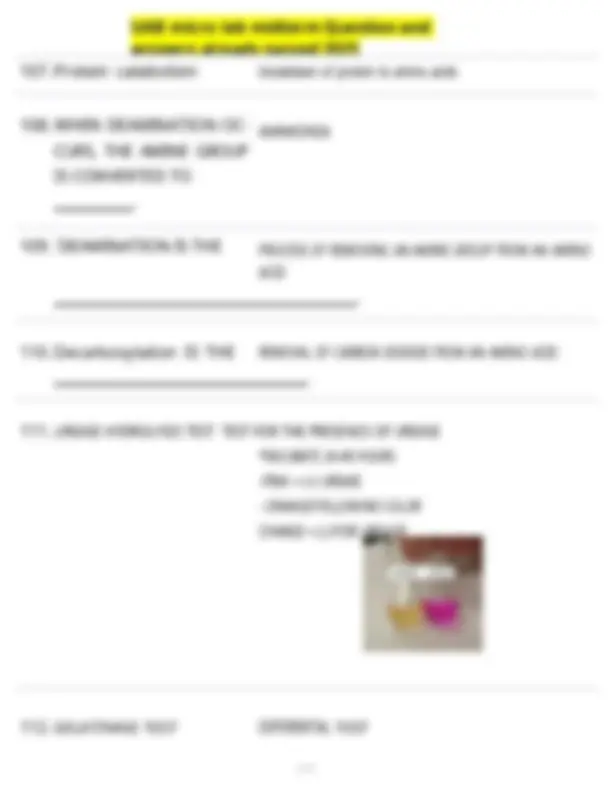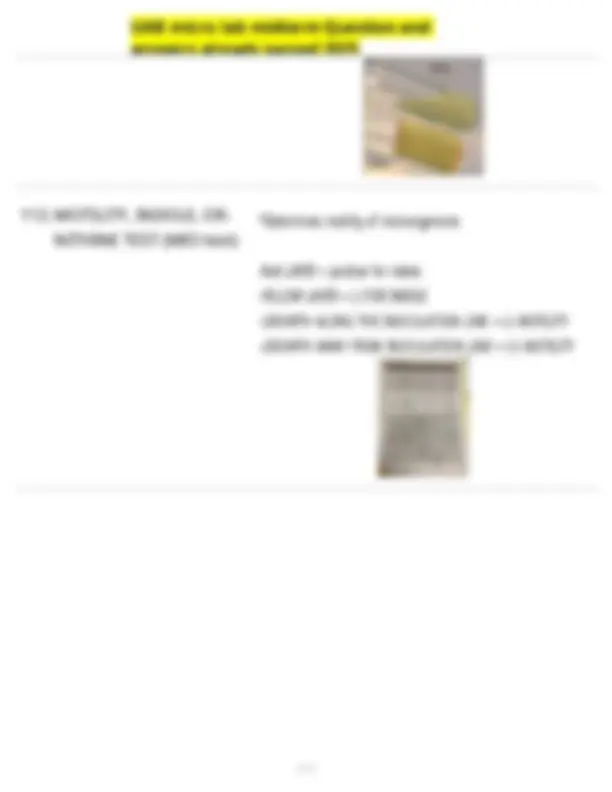Download UAB micro lab midterm Question and answers already passed 2025 and more Exams Microbiology in PDF only on Docsity!
answers already passed 2025
- SCANNING (10X) It is the shortest of the objective lenses and used to scan the whole slide.
- LOW POWER (20X) is longer than the scanning objective lens and is used to view objects in greater detail
- HIGH POWER (40X) is used to view an object in even greater detail
- OIL IMMERSION (100X) used in conjunction with immersion oil to view objects with the greatest magnification
- ARM Narrow, vertical part connecting the head and base. Provides a carrying handle
- STAGE The flat platform where you place your slides.
- MECHANICAL KNOBS moves stage left and right; front and back
- STAGE CLIPS Holds the slide in place
- COARSE ADJUSTMENT KNOBS raises and lowers stage for focusing, can't be used with high power lenses; shouldn't be used with high powered lenses
- FINE ADJUSTMENT KNOBS Moves the stage slightly to sharpen the image
- CONDENSER focuses light through the specimen
answers already passed 2025
- The field of view, or to- tal amount of the spec- imen that is visible, will any time you magnify an object. decrease
- TOTAL MAGNIFICATION objective lens x ocular lens
answers already passed 2025 culture storage
- NUTRIENT AGAR DEEP semi-solid; used to determine motility
- INOCULATING A NUTRI- ENT BROTH
- Sterilize the inoculation loop by holding the wire in the flame until it is red-hot
answers already passed 2025
- INOCULATING A AGAR SLANT
- INOCULATING A AGAR DEEP
- Remove from heat until no longer red-hot, ALLOW LOOP TO COMPLETELY COOL!
- Remove the cap of the bacteria culture
- Briefly pass the mouth of the tube through the flame 2- times before inserting the loop
- Insert the loop to collect culture
- Heat the mouth of the tube
- Replace the cap
- add the culture to the broth by immersing the loop completely
- flame the neck of the broth tube and reapply cap
- re-flame the inoculating loop
- Sterilize the inoculation loop by holding the wire in the flame until it is red-hot
- Remove from heat until no longer red-hot, ALLOW LOOP TO COMPLETELY COOL!
- Remove the cap of the bacteria culture
- Briefly pass the mouth of the tube through the flame 2- times before inserting the loop
- Insert the loop to collect culture
- Heat the mouth of the tube and replace the cap
- Remove cap from slant
- Zig-Zag up the slant
- Flame the neck of the slant and replace cap
- re-flame the inoculating loop
- Sterilize the inoculation needle by holding the wire in the flame until it is red-hot
answers already passed 2025
- BROTH - INTERPRETA- TIONS before inserting the NEEDLE
- Insert the NEEDLE to collect culture
- Heat the mouth of the tube and replace the cap
- Remove cap from DEEP
- INSERT NEEDLE, AS STRAIGHT AS POSSIBLE IN THE MIDDLE OF THE DEEP, AND PULL IT STRAIGHT OUT
- Flame the neck of the DEEP and replace cap
- re-flame the inoculating NEEDLE -GROWTH AT BOTTOM OF TUBE = SEDIMENT -CLOUDY BROTH = TURBIDITY -FILM/MEMBRANE OF BACTERIA FLOATING AT TOP OF BROTH = PELLICLE -CLUMPS OF BACTERIA FLOATING IN BROTH = FLOCCULENT
- SLANT - INTERPRETATIONS - EVEN GROWTH ALONG THE INOCULATING POINT = FILIFORM -BRANCHED GROWTH = ARBORESENT
- SMALL COLONIES = BEADED -GROWTH THAT SPREADS BEYOND THE INOCULATING POINT = EFFUSE -ROOT LIKE GROWTH = RHIZOID
- POINTED GROWTH =ENCHINULATE
answers already passed 2025
- SEMI-SOLID DEEP - INTER- PRETATIONS
-GROWTH ONLY TOWARDS THE TOP OF THE TUBE = OBLIGATE
AEROBE
-GROWTH ONLY AT THE BOTTOM OF THE TUBE = STRICT ANAER-
OBE
answers already passed 2025
- LOOP FULLS OF 2- LIQUID BACTERIA SHOULD BE ADDED TO THE SLIDE.
- A chain OF CELLS TOUCHING END-TO-END
answers already passed 2025 STREPTO - STAINING IN- TERPRETATIONS
- SIMPLE STAINING Use 1 basic stain (colored portion is positively charges) to color cells. Allows for visualization of the cells size, shape, arrangement, and number.
- STAPHYLO -STAINING IN- TERPRETATIONS grape-like clusters
- DIRECT STAINING staining the specimen
- TETRAD - STAINING INTER- ROUND CELLS ARRANGED in a square PRETATIONS
- COMMON SIMPLE STAINS Loeffler's alkaline methylene blue, safranin, Kinyoun's carbol- fuchsin, and crystal violet
- SARCINAE a cube like packet of eight spherical bacteria
- DIFFERENTIAL STAINING TWO OR MORE STAINS/DYES. CAN DIFFERENTIATE BETWEEN OR- GANISMS CELLULAR COMPONENTS.
- NEGATIVE STAINING staining the background instead of the cell
- THE MOST COMMON TYPE OF DIFFERENTIAL STAIN IS THE.
39. THE BACTERIA WILL APPEAR , AND
THE BACKGROUND WILL BE
COLORED.
answers already passed 2025
- Morphology is .
- NEGATIVE STAINING USES A STAIN.
- THREE BASIC TYPES OF MORPHOLOGIES:
- HEAT FIXING IS USED IN NEGATIVE STAINING.
- ARRANGEMENT IS .
THE SHAPE OF THE THE CELL.
ACIDIC
COCCI, BACILLI, AND SPRILLIA
NOT
THE POSITION OF BACTERIAL CELLS
- GRAM STAINING A method of ditterentiating bacteria into Gram-positive and Gram-negative.
- IS A BASIC STAIN, THAT STAINS THE BACTERIA LEAVING THE BACKGROUND WHITE.
- GRAM POSITIVE BAC- TERIA WILL AP- PEAR.
- A SIMPLE STAIN PROCE- DURE THAT STAINS THE
BACTERIA IS CALLED A
answers already passed 2025 METHYLENE BLUE PURPLE/BLUE DIRECT STAIN
- RED/PINK
answers already passed 2025 BACKGROUND THICK
answers already passed 2025
- BACTERIAL CELLS IN GENERAL ARE CHARGED.
- GRAM NEGATIVE BAC- TERIA CONTAIN A LAYER OF PEPTIDOGLYCAN. ALONG WITH A AN OUTER LAYER OF LIPOPOLYSACCARIDES.
- THE METHYLENE BLUE IS CHARGED.
- METABOLISM IS REFERRED TO AS
NEGATIVELY
THIN
POSITIVELY
A CHEMICAL PROCESS/REACTIONS THAT OCCUR WITHIN LIVING
ORGANISMS TO SUSTAIN LIFE
58. WHEN METHYLENE BLUE
IS ADDED TO YOUR
SMEAR THE
CHARGES IN THE STAIN
ARE ATTRACTED TO THE
CHARGES IN
THE BACTERIAL WALLS. AL-
LOWING THE BACTERIAL CELL TO PICK
UP THE COL- OR OF THE STAIN.
59. TWO MAJOR CLASSES OF ENZYMES:
answers already passed 2025
- ALL BASIC STAINS MUST BE BE- FORE ADDING THE STAIN TO YOUR SLIDE.
- ENDOENZYMES
HEAT FIXED
ARE PRODUCED INSIDE OF THE CELLS AND ALSO FUNCTION
INSIDE
O_F.THE CELL
- HEAT FIXING kills the organisms, makes them adhere to the slide, and permits them to accept the stain.
- EXOENZYMES ARE PRODUCED INSIDE OF THE CELL BUT FUNCTION OUTSIDE OF TH_-E.CELL
- SINGLE - STAINING INTER- PRETATIONS
INDIVIDUAL CELLS THAT AREN'T TOUCHING END-TO-END
- SELECTIVE MEDIA suppress growth of unwanted bacteria and encourage growth of desired microbes
- DIPLO - STAINING INTER- PRETATIONS
TWO CELLS TOUCHING END-TO-
END OR A PAIR OF CELLS
TOUCHING
- DIFFERENTIAL MEDIA make it easy to distinguish colonies of ditterent microbes FROM ONE ANOTHER BY HOW THEY METABOLIZE/CHANGE THE
answers already passed 2025 MEDIA WITH A WASTE PRODUCT
- ENRICHMENT MEDIA contain chemicals that enhance the growth of desired bacteria (OTHER BACTERIA WILL STILL GROW)
- Eosin Methylene Blue Agar Selective/Ditterential (EMB) (^) Selective for: Gram (-) Components:

